
[image source](https://www.sa-venues.com/attractionskzn/aliwal-shoal.htm)
Part of my impressionable childhood was scarred by the movie Jaws.
I shouldn’t have been exposed to it at such a young age, and my caring parents did attempt to prevent it, but lying in the back of our family Peugeot 504 station wagon, where I, together with my three siblings had been told to go to sleep for the second show at the Four Ways drive-inn, I was drawn hypnotically by the minimalist but haunting soundtrack overlaying the sound of happily screaming beachgoers and the terrifying climaxes. There I was, disobeying my parents, while peeping over the top of the back seat, horrified by the bloody spectacle when the huge figure of the shark savaged swimmers, shocked by the dead face of the missing boat-hand slipping into view, and terrifiedly transfixed by the mounting tension of the need to rid the sea of this monster.

Thank you, Steven Spielberg; and the tradition of the Alfred Hitchcock thriller; thank you to the subsequent directors who drove home the horror in the sequels - which by now had paved the way for the pattern of Hollywood summer blockbusters and steadily declining follow-ons.
The fright I had experienced had been so real that my siblings, in a moment of spite, need only mention the word Jaws to get me flying out of the bathtub or off the toilet seat: my mind had not yet settled it as impossible that Jaws might find its way through the plumbing and sink its teeth into – even worse – my naked vulnerability.
So what was I doing now, 40 years later, out in the deep, captured in this picture?
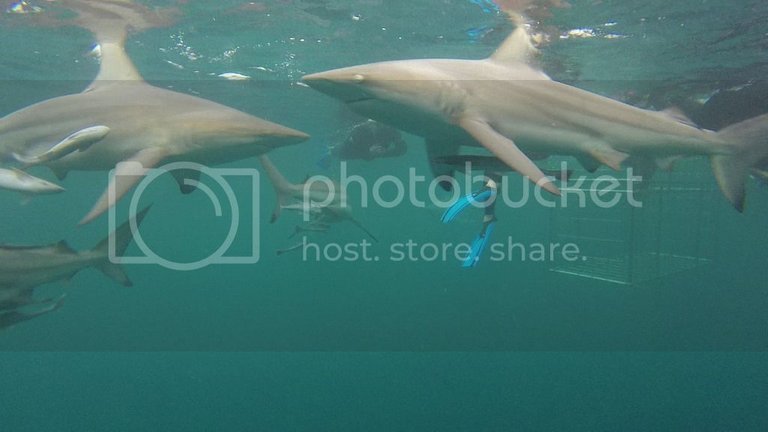
It’s taken above the Aliwal Shoal, an internationally acclaimed natural reef that stretches for some 12 km at a point about 4 km off the coast of Scottburgh, a small fishing village and holiday destination off the eastern coast of kwaZuluNatal, a province in South Africa.
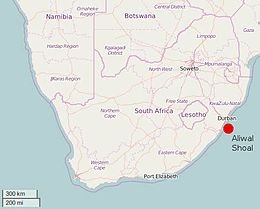
[image source](https://en.wikivoyage.org/wiki/Diving_Aliwal_Shoal)
Not entirely a triumph of the rational over the irrational, but some of the following facts did help: only about 70 shark attacks are reported every year of which less than 20% are fatal. In Africa, most of the continent’s contribution to the statistic occurs in the mouths of estuaries and rivers at the hands of the Zambezi shark also known as the Bull shark, who bites its prey in the murky muddy waters because it can’t see and has no hands to feel. And the fact that our guide assured us that he is out there every day and in eighteen years of operation has not had a single incident.
http://cdn.thinglink.me/api/image/691010755230695425/1024/10/scaletowidth
[image source](http://sharkopedia.discovery.com/types-of-sharks/bull-shark/)
And I had had an earlier experience a few years back with my two older children from within the safety of a cage. Today was my youngest child’s turn, and we had in part succumbed to peer pressure to leave the relative safety of the cage … because everyone was doing it.
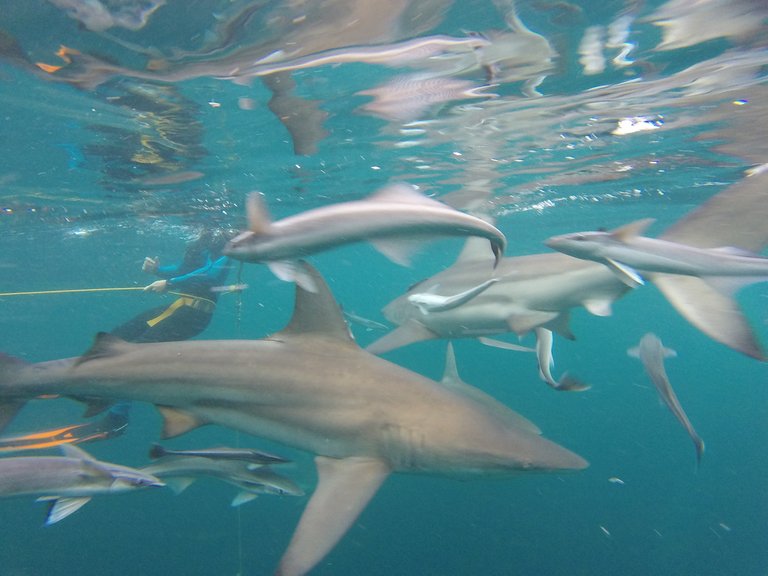
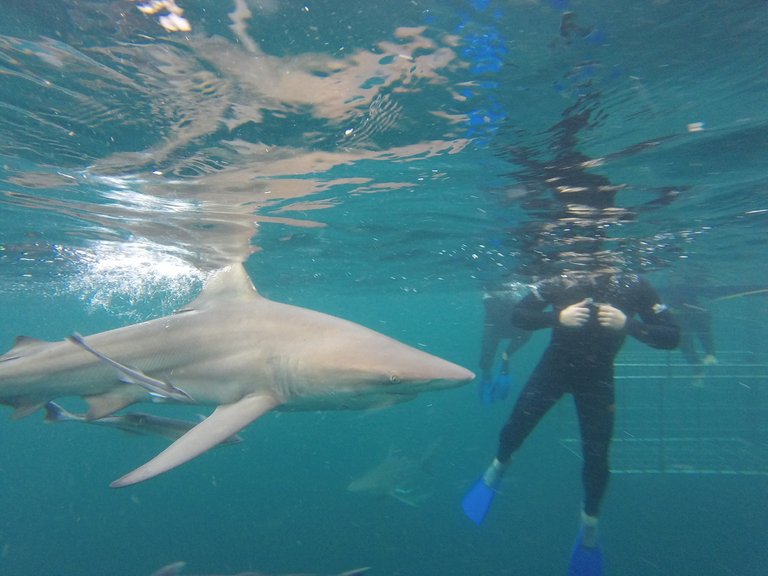
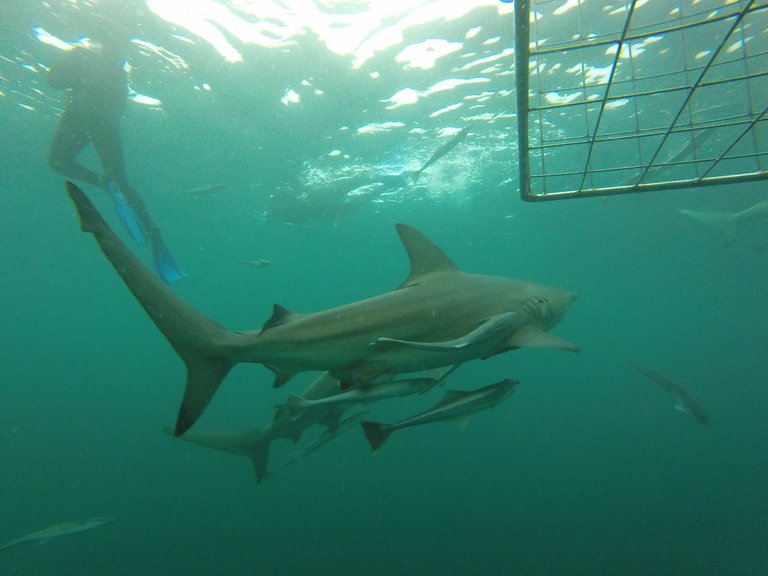
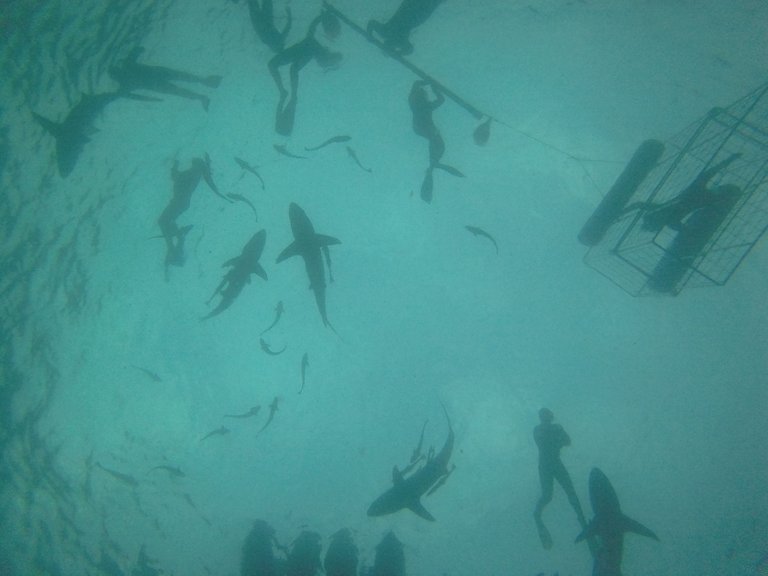
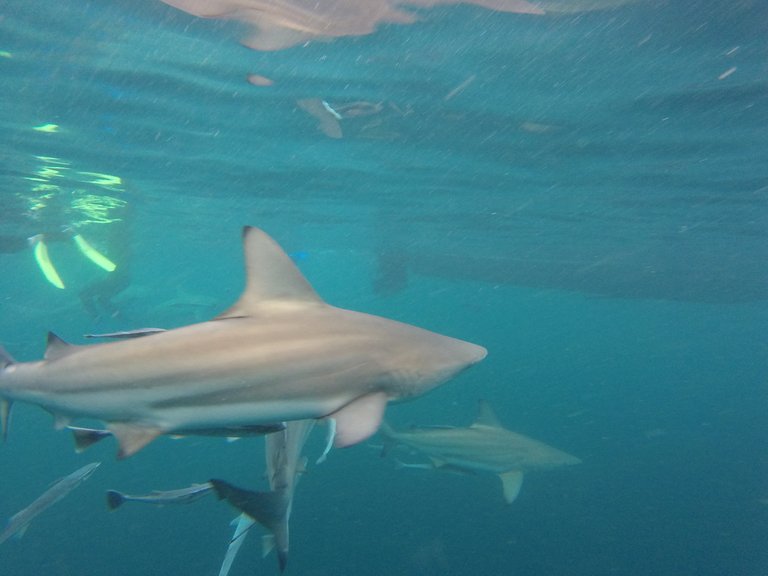
It was a phenomenal experience:
the initial response was nervous trepidation heightened by the fact that we had just seen the sharks swimming around our guide from the side of the boat. Once in the water and fighting the guttural instinctive response at the sight of a two meter “black tip” swimming toward you, the dull silence of being submerged was a sharp contrast to the Jaws soundtrack. The warm Indian Ocean current, great visibility, tight fit of the wetsuit and confidence of our guide came close to comfortable, and I soon left the security of numbers and the safety of the pole. After about fifteen minutes of gently maneuvering around the chumming crates together with these magnificent creatures, hands safely tucked away close to my body, a sense of awe settled upon me and a strong urge to reach out and touch these animals prodded at me. Fortunately, I resisted the urge and remembered the guide’s admonition not to pet “his girls”.
It was an awesome opportunity for me to overcome my fears and marvel at the beauty of these gorgeously proportioned, sleek and powerful fish. Some of them bear the marks of predation themselves, and some disfigurement at the hands of humans. I am a firm supporter of greater attempts at conservation; and have now added sharks to the list of animals that require humans to find a more cooperative use of a shared ecosystem. A 2013 study, reported by Huffington Post (OK allow for the possibility of some self-serving political bias), claims that nearly 11 500 sharks are killed every HOUR. That’s a massive disproportion to the number of human fatalities sharks are responsible for per YEAR. More importantly it’s a horrifying statistic given the fact that sharks are apex predators and the effect that this will have on ecosystems.
A big shout out to Blue Wilderness shark diving operators for a professional and liberating experience! Unfortunately I can’t upload the video.
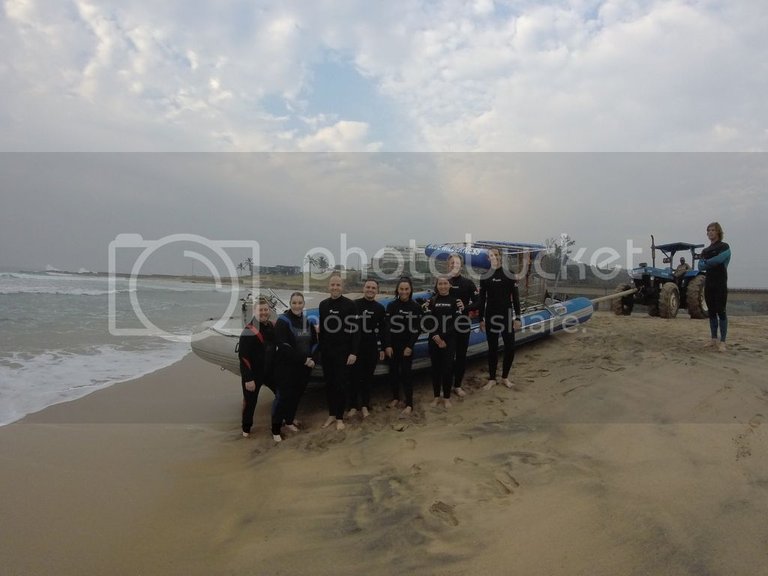
Your post was mentioned in my hit parade in the following category:Congratulations @vuyusile!
My wife and I are hoping to go to South Africa next year and will be including a dive with sharks as part of the trip. Here is a video of a shark dive I went on in the Bahamas and here is a write-up of a shark dive I did in the Gulf of Mexico.
Looks awe inspiring.
It was, thanks!
Good on you @vuyusile. It is important to share these transformational stories with the world, so people learn to care for all species. Keep diving, and talking about the importance of sharks! :)
Congratulations @vuyusile! You have completed some achievement on Steemit and have been rewarded with new badge(s) :
Click on any badge to view your own Board of Honor on SteemitBoard.
For more information about SteemitBoard, click here
If you no longer want to receive notifications, reply to this comment with the word
STOPCongratulations @vuyusile! You have received a personal award!
Click on the badge to view your own Board of Honor on SteemitBoard.
For more information about this award, click here